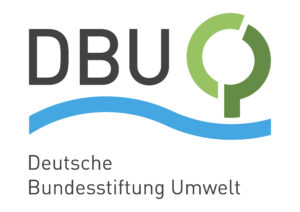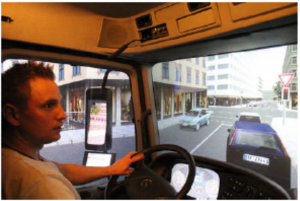In 2015, the United Nations Member States adopted the 2030 Agenda for Sustainable Development. Taking actions to combat climate changes, protecting and restoring the terrestrial ecosystems are important parts of the related goals. Digital technologies can provide a sophisticated framework to raise awareness and facilitiate behavioral change in this domain.
BeeCreative: Fostering awareness for sustainability with a creative AI-based educational technology (2023 – present)
Building on the successful development of the BeeLife app, a follow-up project funded by the Baden-Wuerttemberg Foundation aims at integrating real nature experiences with technology-supported creativity processes to foster awareness for biodiversity. Urbanly integrated information boards will be combined with an interactive AI-based sketchbook to create an innovative learning experience for a broad public. By embedding these learning opportunities in people’s daily life locations, we strive to bring our research even closer to society – with the goal to change as many mindsets as possible!
Sustainability in consumer behavior (2021 – present)
Over the last years, we could observe increasing awareness of sustainability and climate change in society. Individual sustainable behavior emerges by various influencing factors, resulting in different degrees of sustainable behavior. An important factor is the intention behind pro-environmental behavior, which can be goal-directed, motivated by other goals, or habitual. At the same time, good intentions do not always translate into sustainable actions. To develop interventions that promote pro-environmental behavior, a joint PhD project with the Robert Bosch GmbH sheds light on cognitive mechanisms underneath sustainable thoughts and how they stimulate actions.

BeeLife: A mobile learning app for sustainable environmental education in project workshops (2020 – 2023)
Bees are significant contributors to our diverse flora, as they pollinate plants and trees. Particularly the “wild sisters” of our well-known honeybees significantly support this task, but without protective beehives and the care of beekeepers. According to numerous reports, habitats of wild bees are increasingly threatened, and some bee species are already extinct. Supported by the German Federal Environmental Foundation, we developed the mobile learning app “BeeLife”, where students can interact with a wild bee in a virtual space to generate a sense of responsibility at an early life stage. Exploring this virtual space is connected to project workshops in the real space, e.g., school environments, to build awareness for the vast possibilities to take action in daily life. Our evaluation in classroom environments already brought forward encouraging evidence on retention benefits and related motivational effects, emphasizing the value of our educational approach. The app can be downloaded on both the Apple App Store and Google Play Store.

Simulator-based training to foster ecological driving (2013 – 2014)
In a collaboration between the TU Berlin and the SiFaT Road Safety GmbH, we addressed the high economical relevance of ecological driving in long-distance traffic. To train professional truck drivers in a resource-friendly driving behavior, simulation-based training offers a promising and controllable solution. We evaluated the effectiveness of this approach and found stable significant reductions in fuel consumption after the training. Our findings highlight the importance of novel paradigms in raising ecological awareness.
Related publications
- Höpfl, L., Grimlitza, M., Lang, I., & Wirzberger, M. (2024). Promoting sustainable behavior: Addressing user clusters through targeted incentives. Humanities and Social Sciences Communications.
- Höpfl, L., & Wirzberger, M. (2024). Can personalized feedback encourage sustainable washing behavior? A field study. In 53rd Congress of the German Society for Psychology / 15th Congress of the Austrian Psychological Society.
- Stock, A., Stock, O., Mönch, J. M., Suren, M., Koch, N. N., Rey, G. D., & Wirzberger, M. (2024). BeeLife: A mobile application to foster environmental awareness in classroom settings. Frontiers in Computer Science – Digital Education, 5, 1298888. https://doi.org/10.3389/fcomp.2023.1298888
- Stock, O., & Wirzberger, M. (2023). Wildbienen auf dem Weg ins Klassenzimmer [Wildbees on their way to the classroom]. In M. Davis, & L.-K. Peter (eds.)NaturschutzDigital 2023–Innovative Digitalformate in der Naturschutzbildung (pp. 127–129). Bundesamt für Naturschutz (BfN). [PDF]
- Höpfl, L., & Wirzberger, M. (2023). Understanding cognition of laundry habits to foster sustainable behavior. In M. Goldwater, F. Anggoro, B. Hayes, & D. Ong (Eds.), Proceedings of the 45th Annual Meeting of the Cognitive Science Society.
- Mönch, J., Stock, A., Baatz, J., Krieglstein, F., Stock, O., Suren, M., Rey, G. D., & Wirzberger, M. (2022). “Wild sisters” meet app: Connecting virtual and real worlds to foster environmental awareness in classroom settings. In 52nd Bi-annual Congress of the German Psychological Society.
- Prislan, L., & Wirzberger, M. (2022). Exploring cognitive pathways to sustainability – development and validation of personas for sustainable behavior. In J. Culbertson, A. Perfors, H. Rabagliati, & V. Ramenzoni (Eds.), Proceedings of the 44th Annual Meeting of the Cognitive Science Society (p. 3900).
- Wirzberger, M., Bornemeier, J., Kampel, S., Álvarez Serrano, M. G., Ullmann, L., & Rey, G. D. (2021). Umwelt trifft App: Verbindung virtueller und realer Welten in der Bildung für nachhaltige Entwicklung – Kurzbericht [Environment meets app: Connecting virtual and real worlds in education for sustainable development – Short report]. Umweltpsychologie, 1, 123–132. [ARTICLE via WISO]
- Lüderitz, C., Wirzberger, M., & Karrer-Gauß, K. (2016). Sustainable effects of simulator-based training on ecological driving. In B. Deml, P. Stock, R. Bruder, & C. M. Schlick (Eds.), Advances in Ergonomic Design of Systems, Products and Processes. Proceedings of the Annual Meeting of the GfA 2015 (pp. 463-475), Berlin, Heidelberg: Springer. https://doi.org/10.1007/978-3-662-48661-0 [PDF]
- Lüderitz, C., Wirzberger, M., & Karrer-Gauß, K. (2015). Nachhaltige Effekte simulatorbasierten Trainings auf eine ökologische Fahrweise [Sustainable effects of simulator-based training on ecological driving]. In Gesellschaft für Arbeitswissenschaft e.V. (Ed.), VerANTWORTung für die Arbeit der Zukunft [Responsibility for work in future], 61st Conference of the Society for Ergonomics and Work Science, Karlsruhe Institute of Technology (KIT), Institute of Human and Industrial Engineering (ifab), February 25th-27th, 2015, Dortmund: GfA Press. [PDF]
- Wirzberger, M., Lüderitz, C., Rohrer, S., & Karrer-Gauß, K. (2014). „Keep green!“ – Nachhaltige Förderung ökologischen Fahrens durch Simulatortraining? [“Keep green!” – Promoting ecological driving through simulator training in a sustainable manner?]. In O. Güntürkün (Ed.), 49th Conference of the German Psychological Society. Abstracts (p. 570), Lengerich: Pabst Science Publishers.
